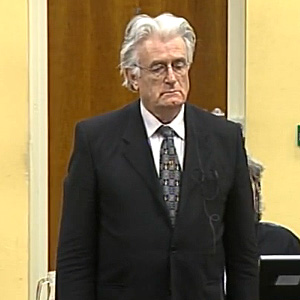Appeals Chamber reverses Radovan Karadžić’s acquittal for genocide in municipalities of Bosnia and Herzegovina

Radovan Karadžić
The Appeals Chamber, composed of Judges Theodor Meron, presiding, Patrick Robinson, Liu Daqun, Khalida Rachid Khan, and Bakhtiyar Tuzmukhamedov, today unanimously reversed Radovan Karadžić’s acquittal for genocide in the municipalities of Bosnia and Herzegovina, which was entered at the close of the Prosecution case. The Appeals Chamber remanded the matter to the Trial Chamber for further action consistent with the Appeal Judgement.
At a hearing on 28 June 2012, Trial Chamber III upheld most of the charges against Karadžić but entered a judgement of acquittal in relation to Count 1 of the Indictment, which alleges that Karadžić was responsible for genocide through his participation in a joint criminal enterprise (“JCE”) that aimed to permanently remove Bosnian Muslims and Bosnian Croats from municipalities in Bosnia and Herzegovina between 31 March 1992 and 31 December 1992. The Trial Chamber found in this regard that there was “no evidence, even taken at its highest, which could be capable of supporting a conviction for genocide in the municipalities as charged under Article 4(3) of the Statute”.
The Appeals Chamber underscored that its judgement did not assess the credibility of the evidence against Karadžić. Instead, the Appeals Chamber considered the Trial Chamber’s application of Rule 98 bis of the Rules of Procedure and Evidence of the Tribunal. At the Rule 98 bis stage of a trial, after the Prosecution has presented evidence but before the Defence does so, a trial chamber considers whether a reasonable trier of fact could be satisfied beyond reasonable doubt of the guilt of the accused on a particular charge. If no reasonable trier of fact could find that evidence adduced by the Prosecution, taken at its highest, proves guilt beyond reasonable doubt, a trial chamber enters a verdict of acquittal.
The Appeals Chamber held, inter alia, that the Trial Chamber erred by finding that evidence adduced by the Prosecution was incapable of proving certain types of genocidal acts.
Specifically, the Appeals Chamber noted evidence indicating that Bosnian Muslim and/or Bosnian Croat detainees were kicked and were violently beaten with a wide range of different objects. The Appeals Chamber further noted evidence indicating that in some instances detainees were beaten until they lost consciousness, and that these beatings resulted in serious injuries, including rib fractures, skull fractures, jaw fractures, vertebrae fractures, and concussions. The Appeals Chamber concluded that, taken at its highest, this evidence could prove that the underlying genocidal act of causing serious bodily or mental harm occurred, and that no reasonable trial chamber could find to the contrary.
Similarly, the Appeals Chamber noted evidence that Bosnian Muslims and/or Bosnian Croats were detained in overcrowded conditions, at times with hundreds of individuals confined to a single room. The Appeals Chamber also noted other evidence suggesting that detainees were denied or received inadequate medical care; were given insufficient or no food, leading to malnutrition, starvation, and severe weight loss; were sometimes deprived of water; and were not given access to proper toilet or bathing facilities, leading to the spread of disease. The Appeals Chamber concluded that, taken at its highest, this evidence could prove that the underlying genocidal act of deliberately inflicting conditions of life calculated to bring about the physical destruction of victims occurred, and that no reasonable trial chamber could find to the contrary.
The Appeals Chamber also concluded that the Trial Chamber erred by finding that evidence adduced by the Prosecution was incapable of proving that Karadžić possessed relevant genocidal intent.
Specifically, the Appeals Chamber noted evidence regarding particular statements by Karadžić and other alleged members of the JCE which could indicate that they possessed genocidal intent. For example, the Appeals Chamber observed that the Trial Chamber received evidence that in meetings with Karadžić “it had been decided that one third of Muslims would be killed, one third would be converted to the Orthodox religion and a third will leave on their own” and thus all Muslims would disappear from Bosnia. The Appeals Chamber also reviewed evidence of criminal acts committed against Bosnian Muslims and Bosnian Croats in municipalities in Bosnia and Herzegovina, such as killings, beatings, rape, and sexual violence. Assessing the Prosecution submissions in their totality, the Appeals Chamber held that, taken at its highest, evidence on the record was sufficient to prove that Karadžić possessed genocidal intent, and that no reasonable trial chamber could find to the contrary.
Karadžić was the former President of Republika Srpska, head of the Serb Democratic Party, and Supreme Commander of the Bosnian Serb Army. He is charged with genocide, crimes against humanity, and violations of the laws or customs of war for acts allegedly committed in Bosnia and Herzegovina between 1992 and 1995. Karadžić was transferred to the Tribunal’s custody on 30 July 2008.
Karadžić represented himself on appeal and was assisted by Mr. Peter Robinson during the appeal hearing on 17 April 2013.
The Office of the Prosecutor was represented on appeal by Mr. Peter Kremer QC.
Since its establishment, the Tribunal has indicted 161 persons for serious violations of humanitarian law committed on the territory of the former Yugoslavia between 1991 and 2001. Proceedings against 136 have been concluded. Proceedings are currently ongoing for 25 accused.
The Spokesperson for Registry and Chambers, Magdalena Spalińska, can be reached on +31 (0)6 5127 1242 or +31(0)70 512 5066 and spalinska [at] un.org
For further information please call the Media Office at +31 (70) 512-8752 or -5343 or -5356

